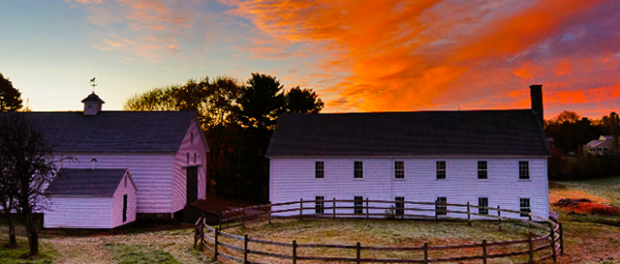Summer Speakers at Wright-Locke Farm in MA

2018 Speaker Series at Wright-Locke Farm in Winchester, MA
We’re kicking off the speaker series this year on May 23rd with world renowned renewable energy researcher, Daniel Nocera, who has created the bionic leaf that carries out photosynthesis – this has huge implications for solar/renewable energy as well as the developing world. For more details check out the Wright-Locke Farm website.
Food and Fuel from Sunlight, Air, and Water
Daniel G. Nocera, the Patterson Rockwood Professor of Energy at Harvard University, has created the artificial and bionic leaf to use just sunlight, air and water to make sustainable fuel and fertilization systems. Join us at the Farm to learn about how these discoveries set the stage for storage mechanisms for the large scale, distributed, deployment of solar energy and distributed food production. In this Wright-Locke Farm talk, Professor Nocera will also discuss how this technology could be particularly useful to the developing world, where large infrastructures for fuel and food production are not tenable.
Encouraging Healthy Bird Populations in Massachusetts
Birds are not only winged harbingers of spring, they are harbingers of healthy ecosystems. 2018 is the ‘Year of the Bird’ and new research exposes the critical role that farmland and other diverse habitats provide for birdlife. In New England, birds associated with grass- and shrublands represent some of the most treasured wildlife in Massachusetts, but they are also some of the most imperiled and rapidly declining bird groups. Most of these birds depend significantly on privately-owned lands, agricultural landscapes, and the efforts of individual landowners in order to survive.
Dr. Kim Peters and Isabel Brofsky will discuss the status of farmland-associated birds, why spaces like Wright-Locke Farm are important for their preservation, and what we can all do to help curb their decline.
Cultivating the Next Generation of Farmers
Although many of us are a few generations removed from having a family member engaged in commercial farming, there are people today who still want to steward the land, grow healthy food, and build community connections through farming. How does someone become a farmer today? With steep land prices, the significant capital required to launch a farm business, and all of the knowledge needed to produce food and run an agricultural enterprise, getting started in farming is a challenge. With an aging farmer population and more than half of our land base predicted to change hands in the next two decades, who will have the knowledge and skills to grow our food and steward the land? Learn about the New Entry Sustainable Farming Project’s strategies to support next generation farmers to get started in agriculture today, build expertise in the field, and support a thriving local food system.
Can History Help us Reinvent the Food System?
New England farmers have been struggling with what we think of as present-day problems—finding fertile and affordable land, competing with larger farms outside the region, balancing food prices with labor and other costs—for nearly two centuries. But the story we often tell about small-scale farming in this part of the world is an over-simplified one, emphasizing decline and farm abandonment rather than continual reinvention and adaptation. The story of how farmers like the Lockes and their neighbors adjusted to changing markets offers important insights for today’s efforts to build a fairer, healthier, smaller-scaled food system. Join us for a presentation and discussion about an expanded and exciting role for historic sites and farm museums within today’s “food movement.”
Chefs as Catalyst Connectors in our Complicated Food World
Join us for a panel discussion with local chefs who have been making strides to reconnect people with the food they eat and the landscapes and people that are behind those meals. What is the role of a chef in this complicated time that we live in? How do they inspire and teach? How are chefs working within our local food systems? Where do the see their greatest impact? These are some of the questions that we’ll be asking our Chef Panel. Make sure to bring your own questions to ask, too!
Food Heals our Communities
Community Servings is a Boston-based not-for-profit that engages the community in preparing and delivering made-from-scratch medically tailored meals to individuals coping with chronic illnesses throughout Massachusetts. In his talk CEO, David Waters, will delve into the successful partnerships they’ve created with local farms and food purveyors through their “Abundance Initiative” to increase access to fresh produce in their kitchens, eliminate waste in the food system, and, ultimately, use food to heal.
Find many more farming resources at https://www.beginningfarmers.org/additional-farming-resources/








 Your Privacy Choices
Your Privacy Choices
Leave a comment